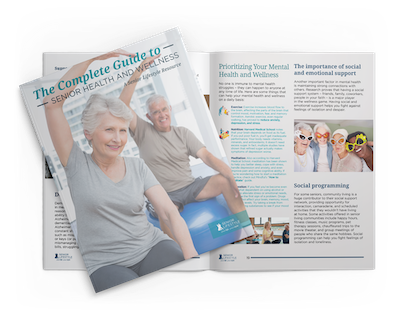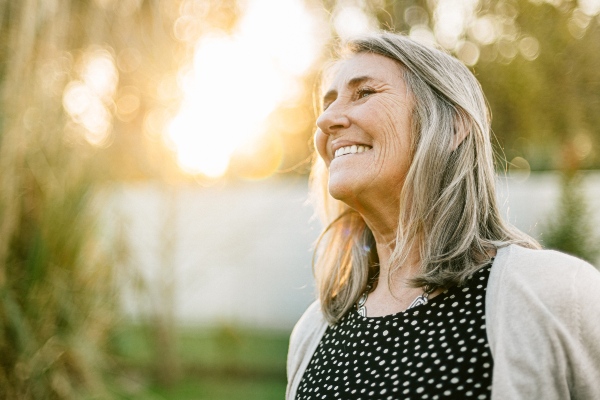We may wrongly assume that increased feelings of sadness, loneliness and isolation are normal emotional changes that occur in older age. The COVID-19 pandemic tested resiliency and endurance to change for everyone.
Even good changes can be accompanied by unpleasant emotions. Yet, for all its good and bad, change means we’re alive. Why, then, do we tend to wrongly associate growing older with an increase in unpleasant emotions and depression?
While it has its challenges, aging can bring positive feelings through supporting healthy lifestyles, maintaining long relationships with friends and growing families, and making new friends.
Find out more about depression in older adults, what to do about it, and how your living arrangements can help as you age.
Growing Isolation and Loneliness of Seniors
Some seniors feel more isolated and alone as they grow older, an article by the National Institute on Aging says. These feelings are not normal to seniors or any age group for that matter.
Because we’re social creatures by nature, pandemic lockdowns and social distancing among other things can lead to feelings of loneliness and depression, according to a report by the National Institutes of Health. The study didn’t factor in the occurrence of these conditions related to age.
The pandemic also increased the chance of more serious complications such as fear of infection, addictive behaviors, post-traumatic stress, prolonged grief and obsessive-compulsive disorders, the NIH report says. Depression was another possible complication.

Download The Complete Guide to Health & Wellness for Seniors
As people grow older, their health and wellness needs change. Read our eBook, “The Complete Guide to Health & Wellness for Seniors” for everything you need to know about staying healthy and happy as we age.
Download the GuideDepression Is Not a Normal Part of Aging
No age group is immune from experiencing depression, but it is not a normal occurrence for anyone, including seniors, the NIH says. Nor is loneliness only experienced by those advancing in age.
In fact, younger adults are more frequently diagnosed with depression than older people, according to a National Institute of Mental Health article on seniors and depression.
Depression and emotional signs of stress in older people may be harder to detect. One reason is that seniors tend to be more reluctant to share concerns that they are feeling depressed.
Sadness is not the main symptom of older adults suffering from depression, which can lead to frequent misdiagnosis, according to NIMH. Thankfully, treatments for depression are effective in most people.
How to Know If It’s Depression
There are a variety of symptoms that indicate someone may be depressed, according to NIMH. Those with a higher risk factor for depression include those who are:
- Alcohol or drug abusers
- Chronically ill
- Disabled
- Enduring stress from divorce, caring for an ill person, or death of a spouse or someone else
- Female
- Having sleep problems
- Lonely or isolated
- Using some medications
A history of depression in yourself or your family is also a risk factor.
Grief vs. Depression
Grief and depression are different, according to NIMH. Grief is a normal emotion that can be experienced after losing someone to death or for other reasons. If grieving persists or is exceptionally severe, it may require medical intervention.
True depression requires diagnosis and treatment, which is effective for the majority of people, including seniors.
Types of Depression
The three most common types of depression, according to NIMH, are:
-
- Major Depression – symptoms severely impact a person’s ability to focus, sleep well, eat normally and get pleasure from life
- Persistent Depressive Disorder – symptoms lingers at least two years, but are not as severe as those associated with major depression
- Minor Depression – symptoms that are not as severe or long lasting as those associated with major depression
Suicide Risk in Seniors
Socially isolated seniors are among those identified as being more vulnerable to possible suicidal tendencies during COVID-19, according to the NIH. Help for these groups includes public education, hotlines and preventative approaches that target vulnerable groups.
How to Help Someone Who is Depressed
Depression is a serious medical condition that requires treatment. A depressed person can’t just will themselves into feeling better. Undiagnosed depression can lead to suicide and increase the chances of phyical illnesses.
It’s important to get help from a health care provider who may prescribe mental therapy, medication or both. Don’t try to self-diagnose depression or to diagnose someone else.
Other Ways to Help a Senior’s Emotional Health
If you suspect someone is depressed, first encourage them to get help. Other, non-medical ways you can help a senior who is depressed or just not in their emotional best, according to NIMH, include:
- Be supportive, exercise patience and offer encouragement
- Invite and encourage them to go outdoors, take walks and go on offered outings
- Listen carefully to what they say
- Note scheduled appointments and medications and remind them
- Offer to take them to appointments or make transportation arrangements
- Remind them that things will get better with time and with treatment, if applicable
It is important to not ignore any comments made about suicide. Take action by contacting their health care provider or therapist. Immediately call the National Suicide Prevention Line at 1-800-273-TALK (8255) if someone is making active suicide threats.
How to Help Stimulate Positive Emotions
Certain things can help ease the symptoms of depression when done in connection with doctor-prescribed diagnoses and treatment. They are not replacements for medical health care, but these activities can help the spirits of seniors and others, according to NIMH:
- Avoid making important decisions or life changes while you don’t feel right.
- Don’t try to do everything at once.
- If performing a large task seems overwhelming, try breaking into smaller tasks.
- Spend some time in the company of those with whom you feel comfortable sharing your feelings.
Other therapies health providers may recommend include physical exercises and dietary or related measures.
Spending time in sunlight can help to raise levels of serotonin and improve moods. Here are more tips on helping seniors suffering from emotional issues or depression.
Exercise Can Benefit a Senior’s Emotional Health
Age-appropriate exercises can benefit a senior’s physical and mental health, according to NIH. Activities such taking a walk, dancing, yoga and bicycling can help support emotional health, benefiting seniors in these ways:
- Help increase energy
- Improve sleep
- Lessen feelings of stress and depression
- Lift mood and provide a sense of well-being
Resources for Helping Seniors’ Emotional Health
Immediately call the National Suicide Prevention Line at 1-800-273-TALK (8255) if someone is making active suicide threats.
- American Psychological Association – 800-374-2721
- National Alliance on Mental Illness – 800-590-6264
- National Coalition on Mental Health and Aging – 309-531-2816
- National Institute of Mental Health – 866-615-6464
Find Comfort and Peace at a Senior Lifestyle Community
Senior Lifestyle provides care for seniors to help them live comfortably as they age. We offer medical and emotional support to encourage the expression and understanding of personal feelings and individuality, increasing self-esteem and having fun. This emotional support dimension promotes compassion and connection to each other and reduces isolation.
Find out more ways senior communities can promote health and wellness to help meet the needs of seniors. Reach out today to learn more about the programs and amenities at Senior Lifestyle communities that can help you.

